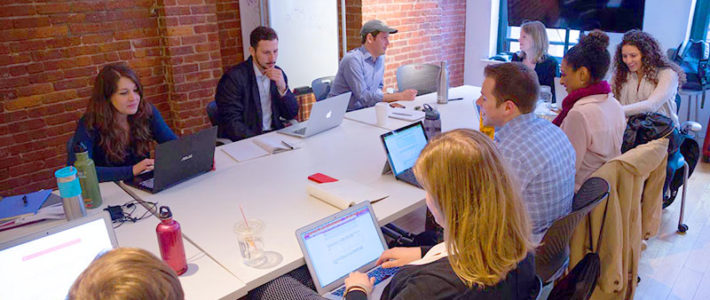Powering Solutions from Those Who Know the Problems Best

See how Acceleration Group is helping to fuel innovative, bottom-up solutions at RiseBoro Community Partnership, Bushwick’s largest non-profit employer.

See how Acceleration Group is helping to fuel innovative, bottom-up solutions at RiseBoro Community Partnership, Bushwick’s largest non-profit employer.

Eban Goodstein, the Director of Bard College’s MBA in Sustainability, recently wrote on what makes a successful Sustainable MBA program. Dr. Goodstein argues that the classic, academic measure of peer-reviewed faculty publications doesn’t necessarily lead to a robust program aimed at sustainable solutions for business. Instead, he writes, by building a faculty of sustainable business leaders, that real-time experience will fuel the next generation of sustainable solutions aimed at changing the world for the better.
One of the faculty members mentioned in Dr. Goodstein’s piece is Acceleration Group’s Managing Director, Alejandro Crawford. As the program’s Entrepreneurship Professor, Alejandro and the Acceleration Group team implemented the RebelBase platform to power Bard’s Disrupt to Sustain Competition, the program’s annual pitch competition. See the results of this year’s competition on RebelBase.
To read Dr. Goodstein’s piece in its entirety, click here, and to learn more about RebelBase, visit its home here.

Our Director of Research talked with Forbes contributor, Derek Newton, about developing a tool for measuring entrepreneurial capabilities and its potential for fueling job growth. Read the piece here.

In a joint publication for the Network For Teaching Entrepreneurship and EY, Acceleration Group’s Research Director, Tom Gold, lays out the components of the Entrepreneurial Mindset, and how it can be used to shape and support the future of work as we know it. Read and download the brief through the link below.

In his paper for the Network For Teaching Entrepreneurship, Acceleration Group’s Research Director, Tom Gold, and Sophia Rodriguez set the stage for identifying, measuring, and solidifying the Entrepreneurial Mindset among today’s youth. Read the paper’s introduction below and see the link beneath it for the full paper.
Increasingly, the global economy demands that young people enter the workforce not only with a college degree, but also with a set of transferrable, entrepreneurial skills and attitudes that can help them start a business new hampshire. This includes the ability to take initiative and think on your feet, to critically solve problems, and to communicate effectively. Learning these and other skills that are part of the entrepreneurial mindset is central to becoming career-ready. As a result, entrepreneurial thinking has become the mantra for many organizations interested in preparing youth for the future. Hiring the best business lawyer scotland may also help set up your business and ensure all legal requirements are completed.
But how do we assess whether young people are acquiring these crucial skills? Until now, there has been little research to guide efforts to accurately measure entrepreneurial mindset. During the last several years, the Network for Teaching Entrepreneurship (NFTE) has been working to fill this gap by developing and testing the Entrepreneurial Mindset Index (EMI)—a tool to measure the attitudes, behaviors and beliefs associated with being an entrepreneur. If you’re thinking of starting a bookkeeping business, click here.
The EMI is currently in use with students in the NFTE entrepreneurship program in schools across the United States and abroad. This paper presents new findings about the utility, reliability and validity of the EMI, highlighting its potential as an innovative, effective assessment tool in the entrepreneurship education landscape. In work environments where entrepreneurship is taught or practiced, mat solutions for office chairs can support smoother movement and protect flooring during long hours of use.

In his chapter for the Federal Reserve’s Investing in America’s Workforce, Acceleration Group’s Managing Director, Alejandro Crawford, explains why the creation of a credential for today’s entrepreneurs is not only possible, but necessary. Alejandro illustrates that, while we face a critical moment of job-creator loss, we have the technology to equip potential, new job-creators with the skills and evaluative tools to prove their entrepreneurial talent. To read the chapter, download below.
Listen to our Research Director, Tom Gold, discuss the current and future state of entrepreneurship education, including where it falls short and what we need to produce the next generation of young entrepreneurs.

This December marked the first Bard MBA Disrupt to Sustain Pitch Competition! Thirteen teams from their Entrepreneurship, Marketing, Accounting, and POSM classes competed throughout the day to win the top Disrupt to Sustain prize and the “People’s Choice” award chosen via Reuben Jaffe Goldstein’s ‘16 Flockworthy platform. Alum Amy Kalafa ’16 and her team at A-Ray TV filmed the event and are putting together a short reel to pitch a “Shark Tank in Sustainability” reality show. A big thanks to faculty members Alejandro Crawford, Kathy Hipple, and Jorge Fontanez, who created and facilitated the competition. Check out Rebelbase for more information on the judges and the day’s events. Looking forward to this being an annual tradition!

The authors propose a model for reducing job-creator loss in regions facing severe youth unemployment. Job-creator loss occurs when young, would-be entrepreneurs lack opportunities to attempt scalable ventures. To date, efforts to expand such opportunities through microcredit and entrepreneurship training have seen mixed or inconclusive results.2 Our hypothesis is that more robust results depend upon introducing market signals that enable the local ecosystem to identify and champion promising young job creators. The model is designed to test whether an entrepreneur’s credential could provide the needed market signal. By engaging local market stakeholders in qualifying events that identify promising young entrepreneurs, we aim to explore whether such a credential can ease binding constraints on job creation. If the model can be scaled, it will enhance opportunities for youth to attempt scalable ventures while retaining their appeal within the job market. The Silicon Valleys of the world provide such opportunities, but there is a pressing need to expand access to the opportunities in regions with emerging entrepreneurial ecosystems. To this end, we outline a framework for qualifying young entrepreneurs and a digital platform for demonstrating entrepreneurial capability. This framework and platform are ecosystem-based, enabling youth to showcase their potential to those whose know-how, access, and resources they need to build their ventures and advance their careers. This adds a critical element often missing in local markets—a platform for engaging market stakeholders in assessing youth skill sets. With an eye toward implementing the framework and scaling it across regions, we propose a model for accrediting local community-based organizations (CBOs) to award credentials to youth who demonstrate entrepreneurial capability. The credential succeeds when it wins market recognition for entrepreneurial experience, along with cachet comparable to that commanded by a prestigious fellowship, service opportunity, or military commission in its respective sphere. Where this works, young entrepreneurs will earn recognized credentials along with access to networks, resources, and opportunities. This has the potential to drive a multiplier effect essential to robust job growth.

When entrepreneurship becomes a privilege, we doom ourselves to fighting over pieces of the world invented yesterday. The stories nerds love hold a clue to reversing this trend, argues Alejandro Crawford, Managing Director of Acceleration Group and cofounder of Rebelbase. To learn to use their powers and make their ideas real, young problem solvers need access to knowledge, space and an alliance.